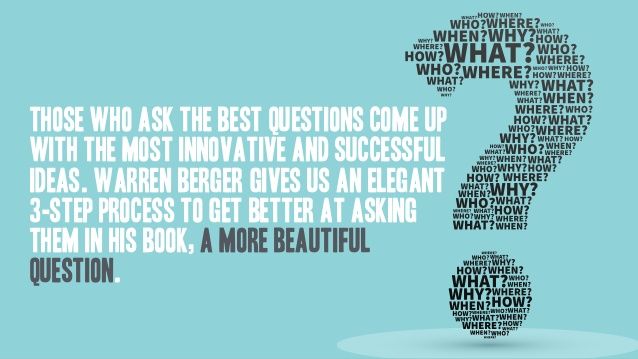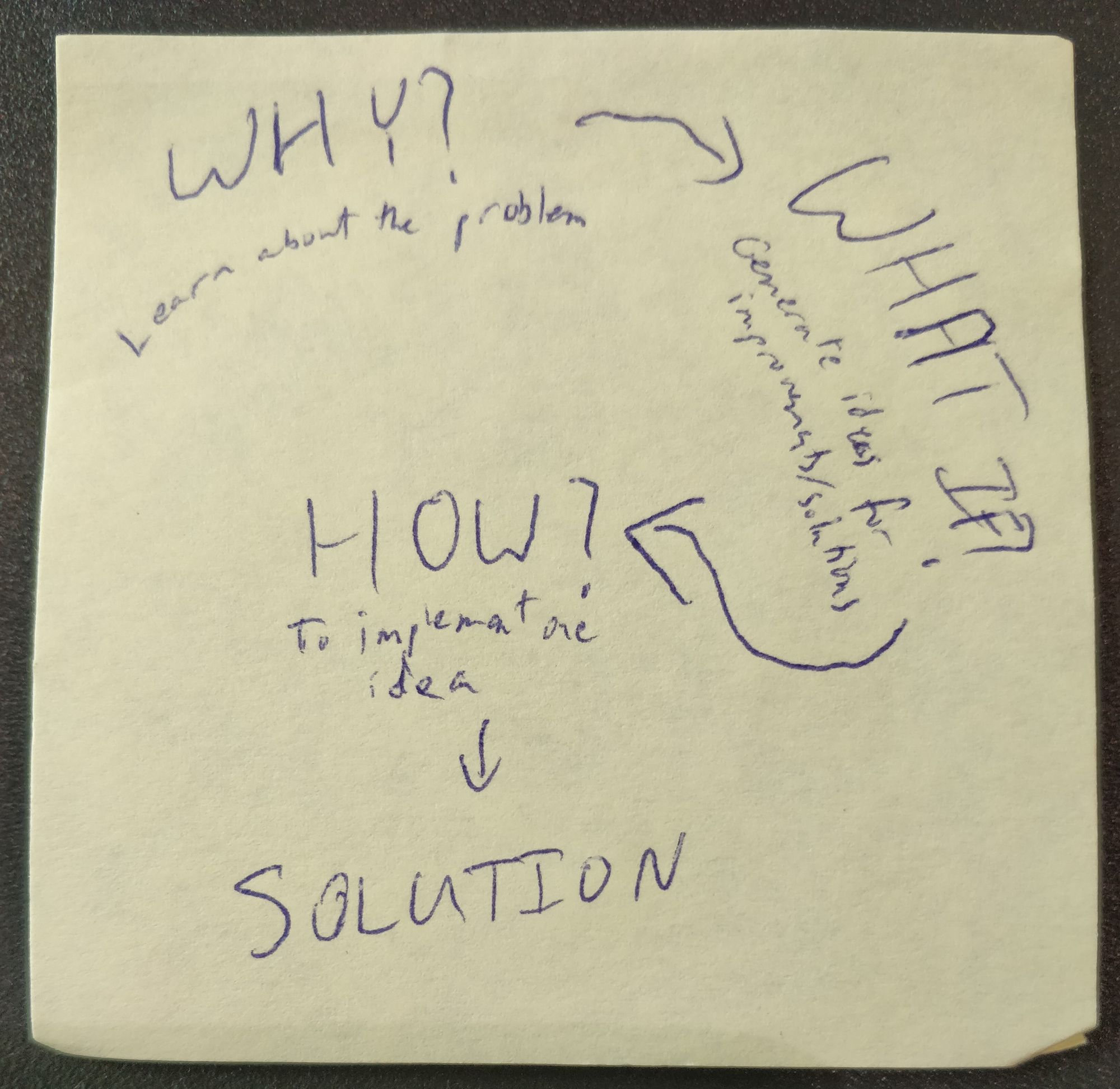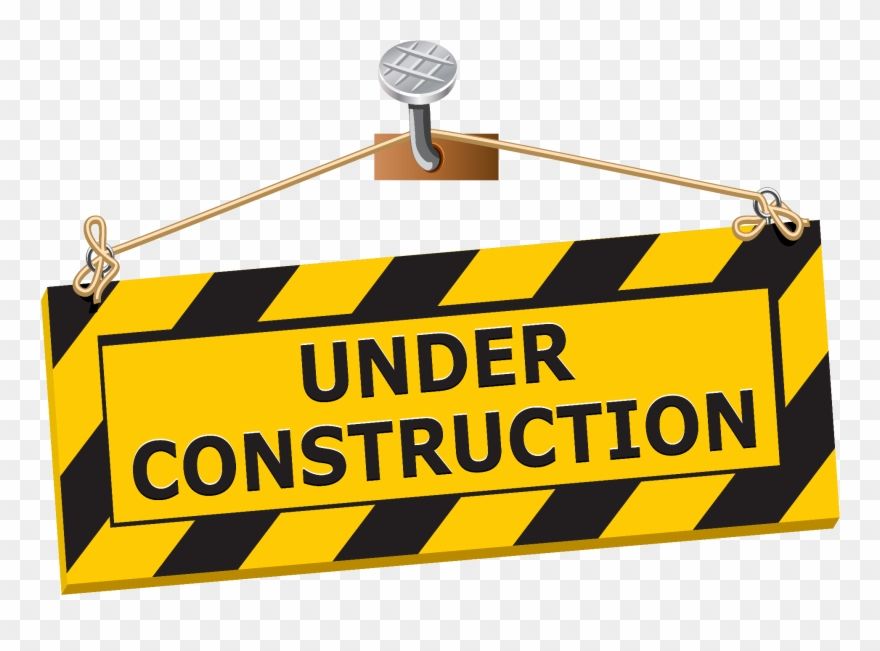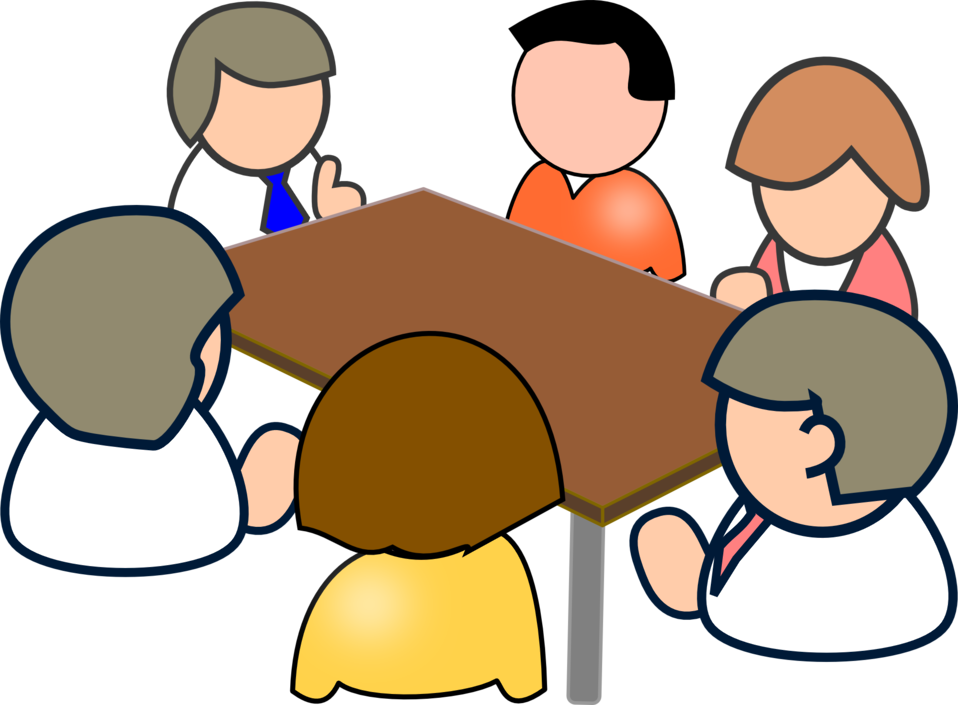These are the key lessons I discovered while reading Warren Berger’s A More Beautiful Question. Most material is directly from the book with a few of my own ideas interspersed

Why do we need to ask questions?
The economic model of the world is shifting. The nature of knowledge, work, and employment is changing.
- What business are we in now?
- Will my jobs still be needed in a few years?
- Is “knowing” obsolete in the age of Google?
- How do you move from asking to action?
The Power of Inquiry: Asking questions is now more important than knowing
Everything starts with “why?”
A Questions Life cycle
- Stage 1: Why is something the way it is? Learn about the problem
- Stage 2: What If something was done differently? Generate ideas for improvements or solutions
- Stage 3: How can this idea be implemented?
- Implement the solution

These are described in more detail further down
Fighting Information Overload

With Information Overload we need to Focus on the Context (tips from John Seely Brown)
- How valid are these beliefs?
- Is there an agenda behind this information?
- Is the data stale? Out of date?
- How does it relate to other information I have?
- What assumptions am I (or the others) making?
5 Learning Skills and Habits
When you learn anything new, ask for the following:
- Evidence - Is it true? How trustworthy is this info?
- Viewpoints - How would this look from other perspectives?
- Connection - Noticing any patterns? Have I seem something similar before?
- Conjecture - What if this information was different? What implications would it have?
- Relevance - Why does this matter? (Did I just waste my time reading that?)
Learning to ask “Why?”
- Why does this situation exist?
- Why is it a problem?
- Why does it create a need or opportunity?
- Who is it a need/opportunity for?
- Why has no one addressed this yet?
- Why do I want to spend more time thinking about this?
When you have a question, let it brew in your head. It’ll lead you to combinatorial thinking where you draw connections between it and other things you know or learn.
Breaking Down the Innovation Question Process
Start with Why? => Ask What if? => Figure out How?

Stage 1: Why?
How to get a Good Why Question?
- Step back
- Notice what others miss
- Challenge assumptions (including your own)
- Get a deeper understanding of the situation/problem through contextual inquiry
- Question the questions being asked (including your own)
- Take ownership of a particular question
Questioning the Questions
Your questions can be biased
- Why did I come up with that question?
- What assumptions does that question make?
- Is there a different question I should ask?
- Repeat the above until you get a good answer
Tools for Improving Questions
- Shrink or Grow the question in scope (“is X true for the world?” vs “is X true for my city?”)
- Open or Close the questions to catch assumptions (“Why is X true?” vs “Is X true?”)
- Tailor questions to the specific relevant context, aka Contextual Inquiry (“Is X true in India?”)
Contextual Inquiry
Talk to actual people and listen to their stories, problems, situations, etc
This requires your decision to be committed to this question. Otherwise you won’t bother doing this
Productive Obsession
Actively pursuing a question. You’ll start thinking of it all the time.
This gradually leads you to the “What If?” stage
Stage 2: What If?
Here are some tactics that can help you come up with ideas when you’re in the “What If” stage

Connective Inquiry
- Study various fields and let it peculate in your head
- Boost: Take a few disparate resources/facts/tools and see how they could be used to solve a problem
Thinking Wrong
Thinking in ways that have nothing to do with the problem you’re trying to solve. Mixing and matching random things
This is a form of Divergent Thinking
Connection Exercise (page 113 of the book)
- Take a random word and think of ideas around it. You can rearrange letters to get other words, etc.
- Take a 2nd random word and do the same
- Can you combine both words?
- Do it in the context of the problem you want to solve
Random Connections
- Try to connect random, nonsensical things
- An oven that doesn’t heat. What can you do with that?
- A car that doesn’t move
Invert Reality
What if restaurants gave you a menu only when you left?
What impact would that have?
Idea Storming
- Come up with at least 50 questions about the problem
- Be sure to push yourself to 50 questions. That’s around when the best questions come
- This is an alternative to brainstorming
“How Might We…?” - This tends to open up the thinking process better than the question “How can we?”
Perspective Shift: Ask questions from the perspective of another person (“How would Hollywood address this?”)
Stage 3: How?
You came up with many ideas in Step 2. Now chose one idea to pursue. It’s time for convergent thinking

Quickly Identify Bad Ideas via Feedback
You need to get feedback on your idea, and get it fast. There are multiple ways to do this
One tactic: Share the idea to get feedback. Something like a napkin sketch and asking “what do you think of…” could be a good quick protype to use
Rapid experimentation: find the smallest possible experiment that you can run to validate or invalidate your idea. This is a form of creating a Minimum Viable Product
In every experiment you must ask: What will I Learn?
- Then work backwards to the simplest experiment which will teach you that. This is the real MVP
Note: experimenting will lead to many failures and disappointments
- Instead of focusing on the failure, focus on the whys behind that failure and what you can learn from it
- Note what went right
- Ask “Am I failing differently each time?”
- Remember, you’re much better off if you fail after a few hours or days of effort instead of after many months of effort!
- Edison said “I have not failed. I’ve just found 10,000 ways that won’t work.”
Learn to note when you or others are experiencing Cognitive Dissonance, a mental discomfort when facing conflicting attitudes, beliefs, or behaviors
- This is a sign that you are doing something new
- This is for getting early feedback on your idea
Collaborative Inquiry
Get help from others!
- “Do you find this interesting? Want to join me and try to answer it?”
- To the internet!
- Not Impossible Labs - A site to find others
“Many more people are drawn to an existing idea they can join in on & help to improve or advance, rather than starting from scratch on their own.”
You are inviting collaborators as equals on a project. “Your” question becomes theirs too.
Questions belong to everyone
“Share your question in hope of you getting something new: solution, perspective, insight, purpose, etc. That thing will be yours”
Questioning in Business

- Why are we in business? And what business are we really in?
- What if our company didn’t exist?
- How can we make a better experiment?
- Should mission statements be mission questions?
- How might we create a culture of inquiry?
Living Better by Asking the Right Questions

- What if we start with what we already have?
- What if you made one small change?
- What if you could not fail?
- How will you find your beautiful question?
What is your goal/purpose in life?
- Your mission should fit in one sentence
- This is a mountain you are climbing. Why are you climbing it?
How can I develop a sense of community?
- Family
- Friends
- Neighbors
- Block party?
What did I love doing as a child? Can I still do any of it?
What are you doing when you feel most beautiful/happy?
“It’s easier to act your way into a new way of thinking than to think your way into a new way of acting”
- Fake it till you make it
- [Zain aside: I’m not sure how true this statement is. It seems to apply only to certain types of things]
If we can’t agree on an answer, can we instead agree on a question?
Teaching to Question
- Can a school be built on questions?
- Can we teach ourselves to question?
- How can we make “being wrong” less threatening?
Interesting Teaching Style: Activity-Permissive Education by Mayo Clinic. Lets kids move as they learn

How can parents teach their kids to question?
- Ask the kids open ended questions
- Get the kids to ask you questions (and guide them to certain questions)
- Don’t answer those questions. Instead explore through experiments or personal experience and have the kid form a hypothesis about the answer
- When kids come home from school, ask them “Did you ask a good question today?”
Question Formulation Training
This is a strategy that has been successfully used in classrooms
First offer a premise (e.g. “torture can be justified”)
Stage 1: Divide people into groups to Brainstorm questions
Rules:
- Write each question down
- Don’t debate or try to answer questions
- Just keep trying to think of more questions
Stage 2: Improve the questions by converting open questions to closed and vice versa. For example you’d change between “why is torture effective” <==> “is torture effective”
- This shows that the same question asked differently can make you think in a different space
Stage 3: Prioritize. Identify the top 3 questions to move the discussion forwards
- It teaches them how to analyze questions and find ones to pursue further
Question Teaching Process
- Teachers design a focus for the questions
- Students produce questions
- Students improve their questions (open vs closed)
- Students prioritize their questions (top 3)
- Students and teachers decide on next steps for acting on those questions
- Students reflect on what they’ve learned
Imagine: What if the teacher was willing to ask questions that they themselves don’t know the answer to? If the class is interested then…“Lets figure this out together”
Other thoughts
How do you reward questioning in others or in children to encourage this behavior?
- Would the process of discovery will be it’s own reward?
Ideas for a game based on asking questions:
- Learn to ask better questions via proposing and improving questions on a given prompt
- Example prompt: Given some set of random resources, how can you solve problem X?